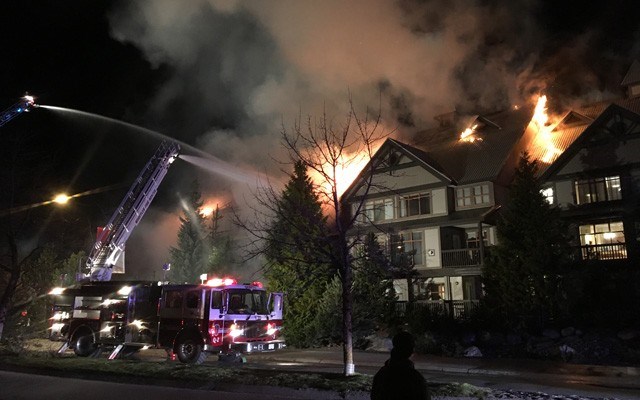Tragedy casts a large shadow over Whistler, just like the twin peaks that have given the resort its claim to fame.
Whether or not we want to admit it, death is never as far away as we'd like to think in our community. It lurks around every icy bend in the road and each tricky run on the hill.
The recent fire at a Northlands Boulevard condo building, or any one of the string of tragedies that has struck Whistler over the last few years — the May long weekend stabbing death of a Burnaby teen, or the drunk driver who claimed the lives of two prominent locals back in 2015 come immediately to mind — are testament to our close relationship with catastrophe.
We're celebrated as a town with a particular joie de vivre because of the very fact so many of us have chosen to live life on the razor's edge. It's a trade-off; heightened risk for heightened pleasure that Whistlerites, whether consciously or not, have come to terms with.
But what impact does our close proximity to disaster have on the character of the community?
It's a question that probably doesn't get asked enough around here, and understandably so. Tragedy doesn't attract those coveted tourist dollars, and certainly doesn't mesh well with Whistler's reputation as a world-class winter wonderland. Whether it's a weekend getaway or a years-long sabbatical from "normal life," most of us have come to Whistler to escape, to catch a fleeting glimpse of a snowy mirage amid the desert of our day-to-day doldrums, not to be reminded of our various existential crises. We are in the fantasy fulfilment business in Whistler, and nothing brings a fantasy crashing down more violently than a heavy dose of unfiltered reality.
And how we frame the discussion around sudden death as a community is important, almost as important as the measures we take to prevent it. One imagines that for long-time locals, so accustomed by now to the wail of an ambulance siren or the foreboding whirs of a rescue helicopter, that tragedy gets easier to process over time. Whether that's true or not is another issue, but with so many newcomers to the community each year who aren't yet attuned to the rhythms of the Whistler bubble, it's we, the established residents, who need to start the conversation around tragedy the right way.
It's a question a team of UBC researchers have looked at closely, with a 2013 study aimed at assessing just how young men in Whistler deal with the most tragic of circumstances. After interviewing 15 subjects between the ages of 19 and 25 who had suffered the unexpected death of a friend, the researchers found that young Whistler men process grief much differently than their Vancouver counterparts, where a similar study was conducted.
"The atmosphere in Whistler is all about living the life, it's all about taking risks and following your desires, so when a friend dies over the course of taking risks, there's a reflex among some men to minimize the tragedy by saying 'he died doing what he loved, so it's OK,'" researcher Dr. Genevieve Creighton told me.
While those who died on the mountain were eulogized by friends as heroes, deaths from drug or alcohol abuse were harder to reconcile for the survivors, according to Creighton.
And that makes sense. It's easier to lessen the impact of a sudden, senseless death when your friend is a martyr to a lifestyle of their choosing, rather than a slave to their personal vices. But both causes stem from the same concept of 'living for the moment,' which appropriately enough doubles as the name of UBC's grief study, so we should be treating them as two sides of the same coin.
Obviously, Whistler isn't the only place around the world where death looms large. In Mexico, it's treated as just another fact of everyday life, and is celebrated on Dia de Los Muertos not as a distant date to dread in the unknowable future, but as an inevitability that should be treated with respect. From personal experience I can also tell you that the people of Beirut, a city that for many Westerners still conjures images of political strife and endless war, live with such a passion, such a fervent sense of joy that is as refreshing as it is infectious.
The reasons so many cultures around the globe have less of an uneasy relationship with death than we do, is because it's been accepted as just another seam woven into the fabric of everyday life. In Whistler, where disaster hovers so near, maybe it's time we tried to do the same.




